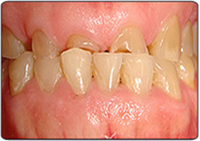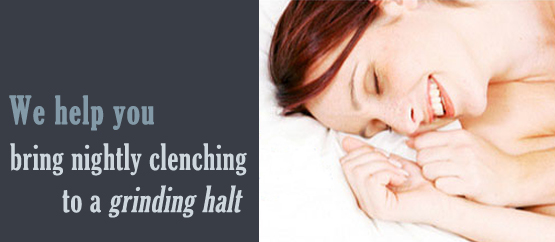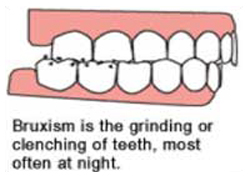|
Teeth grinding is also known as bruxism.When we grind our
teeth on a regular basis, we have a condition called bruxism.
Night-time grinding or clenching may negatively affect your
teeth and your TMJ (Temporo-Mandibular Joint). The TMJ is
the joint located directly in front of your right and left
ears. As you open and close your mouth, you can feel the joint
moving. Consistent long-term grinding and clenching from stress
or a bad habit may cause the joint to make sounds when you
open or close your mouth, such as clicking or popping.
Grinding and clenching creates a lot of physical stress on
the teeth, the gums, the jaw bones, the TMJ and the muscles
of the face. The high forces generated from the grinding or
clenching can cause gum recession and tooth loosening, increase
the incidence of tooth fractures and crack lines, cause muscle
spasms and irritate your TMJ. In severe cases, some people
have difficulty opening their mouth normally, and experience
significant muscle pain and headaches.
The Consequences of Bruxism
Over the years, the accumulated toll of bruxing can produce
a wide range of damage that includes:
• Front teeth worn down so they are flat and even in
length.
• Micro-cracks and broken fillings, eventually leading
to nerve damage.
• Teeth ground down to the dentin, causing sensitivity
to heat and cold.
• Gum recession, due to pressure on the gum line.
• Loose teeth, caused by the rocking effect of grinding
/bruxing, and gum pockets, also produced by the back-and-forth
rocking effect.
• Headache and aching jaws due to overuse of muscles.
 Treatments
for Bruxism Treatments
for Bruxism
While there is no cure for bruxism, the condition can be managed
through treatment.
One such practical remedy is the use of a night guard that
has been custom-fitted by your dentist. Wearable at night,
it acts as a bumper guard, absorbing the force of the clenching
or grinding. While horseshoe-shaped over-the-counter night
guards are also available, they tend to be uncomfortable and
are so soft that they may get chewed away. In addition, over-the-counter
night guards do not account for occlusal discrepancies that
may be the source of your bruxing problems; a night guard
custom fabricated by your dentist's laboratory technician
does and so is highly recommended .
You may be a good candidate for a protective night-guard to
prevent further negative effects from grinding or clenching.
The night-guard will preserve the health of your teeth, prevent
harmful wear of the natural tooth structure, and minimize
further gum recession. More significantly, it will minimize
permanent trauma and injury to the jaw muscles and joints
(TMJ).
APPLIANCES
FOR TEETH GRINDING
While there is no cure for bruxism, the condition can be
managed through treatment.
One such practical remedy is the use of a bite plate/night
guard that has been custom-fitted by your dentist. Wearable
at night, it acts as a bumper guard, absorbing the force of
the clenching or grinding. While horseshoe-shaped over-the-counter
night guards are also available, they tend to be uncomfortable
and are so soft that they may get chewed away. In addition,
over-the-counter night guards do not account for occlusal
discrepancies that may be the source of your bruxing problems;
a night guard custom fabricated by your dentist's laboratory
technician does and so is highly recommended .
You may be a good candidate for a protective night-guard to
prevent further negative effects from grinding or clenching.
The night-guard will preserve the health of your teeth, prevent
harmful wear of the natural tooth structure, and minimize
further gum recession. More significantly, it will minimize
permanent trauma and injury to the jaw muscles and joints
(TMJ).
Nightguards/Bite Appliances
A nightguard is the best treatment for bruxism. A night guard
is a thin piece of hard plastic made from impressions of your
teeth placed on the upper or lower teeth. The nightguard is
hard enough to be durable, but since it is softer than teeth
it will protect them from wear. When the nightguard is tried
in, it is adjusted to fit your bite evenly and smoothly. They
help protect your natural teeth from night grinding and are
one the the most common appliances used to treat TMJ problems
and they act as a muscle deprograming device. These are custom
made for each patient and are easy for the patient to adapt
to wearing during the night.
Dental night guards are removable and designed to be worn
in the evenings and at bedtime. Night guards are effective
for a variety of dental issues, including the treatment and
prevention of Temporomandibular Joint Disorder (TMJ). Symptoms
of TMJ include chronic jaw pain and gritting or grinding of
teeth. Untreated symptoms can lead to tooth displacement,
bone loss, and fracturing of the teeth.
Advantages of night
guards:
You may be a good candidate for a protective night-guard to
prevent further negative effects from grinding or clenching.
The night-guard will:
• preserve the health of your teeth
• prevent harmful wear of the natural tooth structure
• minimize further gum recession.
• alleviate symptoms such as headache, neck, ear or
back pain.
• More significantly, it will minimize permanent trauma
and injury to the jaw muscles and joints (TMJ).
|



 Treatments
for Bruxism
Treatments
for Bruxism